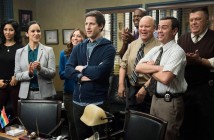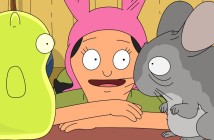Game of Thrones: Season 4 Episode 7 - Mockingbird
May 18, 2014, 9:00 p.m. (EST), HBO
Few shows are better at long, drawn out monologues than Game of Thrones. This is one of the show’s chief assets, as it allows backstory, character motivations, and plotting to all be dealt out within long, meandering speeches that its bevy of excellent performers can chew into with relish. Most of the best moments in the series are big speeches, whether they come in the form of titanic moments like Tyrion’s raging against the court last week, or in quieter ones, like the scene in which Oberyn Martell explains why he will be Tyrion’s champion, even if no one else will. “Mockingbird” is an episode chock full of moments where the characters reveal themselves, their pasts, and the journeys their on with quiet little speeches that are enough to blow the doors off the place.
Early in the episode, the Hound and Arya come across a dying man who gives them the occasion to contemplate death and nothingness, allows The Hound to display his core decency by dispatching the poor guy, and lets Arya harden even further, as she puts Needle through the heart of an escaped prisoner without pause. This subplot has been an episodic reminder about the horrors of war on the little people in Westeros, and in this regard, it has been far more effective at reminding us how brutal this world can be on people without power than the rape parade that occurred North of the Wall (and possibly, nightly in Benioff and Weiss’ dreams). People muddle by, or they don’t, in the shadow of the dealings we usually see. People lose everything to the greed, gluttony, or sheer cruelty of those with even the illusion of power or authority. Things are pretty bleak in Westeros even if you have power, but for those that don’t, often the dream is just crawling back to the ashes where your hut used to be before you die. Arya asks the man why he continues to live in this world, but really, she is asking herself. Why go on when you have nothing to hope for but more darkness? Why continue when all that keeps you alive is hate? Arya’s greatest dream, the thing she clings to when she looks for inspiration to stay alive, is just a list of people she would like to murder. Beyond that, what does she have to live for?
“Mockingbird” is an episode I would offer up to people wondering what the Game of Thrones formula looks like when it is operating at its best. Generally, this show’s best episodes break with its format in some way, spending way more time in one location or creating a setpiece that makes everything around it fall away. Yet “Mockingbird” jets around the show’s various locations, turning in smart, well-written, emotionally resonant scenes at basically every turn. It may not be the greatest episode of this season, but it will likely be the best episode in the show’s standard mode. No scene is really weak here (even the Melisandre/Selyse exchange is tinged with sadness and import, giving us glimpses into two of the show’s smaller characters while teaching us a bit more about just what the Red Woman does in service of her God) and linking them in subtle but powerful ways. The name “Mockingbird” refers to the sigil of House Baelish, and in some sense, the episode is about the various families of Westeros and the ties that bind them together.
We get insight into the Clegane household as Sandor tells Arya about how he got his scars. The pain in his voice as he talks about having to live with the fact that his brother did this to him tells us much about his worldview. The name Stark, and Brienne’s tendency to project integrity to anyone she comes into contact with, is enough for Hot Pie to admit he knew Arya, and to get Brienne and Pod on the road to The Eyrie (and yes, I would watch a series of vaudevillian comedies with Brienne and Pod headed for various Westerosi locations). We see the Lannister brothers bond over the idea of ending their family line once and for all, mostly just to stick it to their dynasty-obsessed old man. Selyse is motivated, in part at least, by her belief in the Lord of Light, and in Stannis as the God’s chosen savior, but at least some of that is tied up in the idea of legacy (which we discussed previously this season).
More specifically, though, the episode is often about what it feels like to be the second child in a world where inheritance passes to the first. The Hound was mistreated by his father, who chose to protect The Mountain (played by another new actor tonight, like some hulking, sword-wielding Bobby Draper), his heir, by covering up the abuse. Tyrion was never more than a second son, forced to make his way in the world with only hatred and disdain coming from his father. And Lysa Arryn will forever be overshadowed by her older sister, forced to claw for scraps of Littlefinger’s affection even now that Catelyn is in the grave, and killed by Petyr for how desperately she tries to cling to the one thing in the world she thinks might be hers.
Oberyn Martell is also a second son (though his older brother Doran goes unmentioned tonight), though his childhood seems to be much happier than anyone else’s that is illuminated tonight (except maybe Sansa, though her memories are bittersweet at this point). Yet his relationship with his sister, and the way that contrasts with Tyrion and Cersei’s relationship, helps to tie him to Tyrion (the fact that Cersei chose The Mountain as her champion is the real lynchpin, though).
“Mockingbird,” ends, of course, with Petyr Baelish, an only child distanced from everyone and almost entirely unloved, coming one step closer to the completion of his grand plan, and to his victory at this game of thrones. In a few episodes, Littlefinger has deposed a king, secreted away the theoretical heir to the North, and now established himself as the power in the Vale (in addition to his in-name-only ownership of Harrenhal). This episode flies around Westeros reminding us of who these characters are, but it ends with an exploration of one of the series’ most complex and multifaceted creations: Petyr Baelish. He has loved but one woman in his life, he tells Lysa as he shoves her out the moon door, and that is Catelyn Stark. Yet he kisses Sansa in the snow, and kills to protect her as well as to advance his agenda. The mockingbird is a deceptively passive sigil for a House constantly climbing to new heights, a house Petyr Baelish himself built from rubble, and one that may, if he’s lucky, survive long enough to have its own bickering descendants squabbling over its legacy.
The Roundup
- -“So why go on?” “Habit.”
- -“That’s where the heart is. That’s how you kill a man.”
- -“She’s dimwitted.” “If I wanted wits, I’d marry you.”
- -“Its tempting to see your enemies as evil, but there’s good and evil on both sides of every war ever fought.” “Let the priests argue over good and evil. Slavery is real. I can end it, I will end it, and I will end those behind it.”
- -“You’re not interesting enough to be offensive.”
- -“Do tell. I’ve got every kind of filth down here except the kind I like.”
- -“It is rare to meet a Lannister who shares my enthusiasm for dead Lannisters.”
- -“‘That’s not a monster,’ I told Cersei. ‘That’s just a baby.’”
- -“In a better world, one where love could overcome strength and duty, you might have been my child. But we don’t live in that world.”
- -SPOILERS: Lysa Arryn’s death is actually the last thing that happens before the epilogue in A Storm of Swords, but with how much the series has to shuffle through in these final three episodes, it makes sense to push it forward a few weeks. It seems fairly obvious now that the next episode (in two weeks) will see the duel between The Mountain and Oberyn, the ninth episode will feature the assault on Castle Black (which will apparently be combined with the skirmish that leads to Ygritte’s death?), and the finale will almost certainly conclude with the introduction of Lady Stoneheart. Yeah, the rest of this season will probably be pretty great.
“Mockingbird” is an episode I would offer up to people wondering what the Game of Thrones formula looks like when it is operating at its best.




